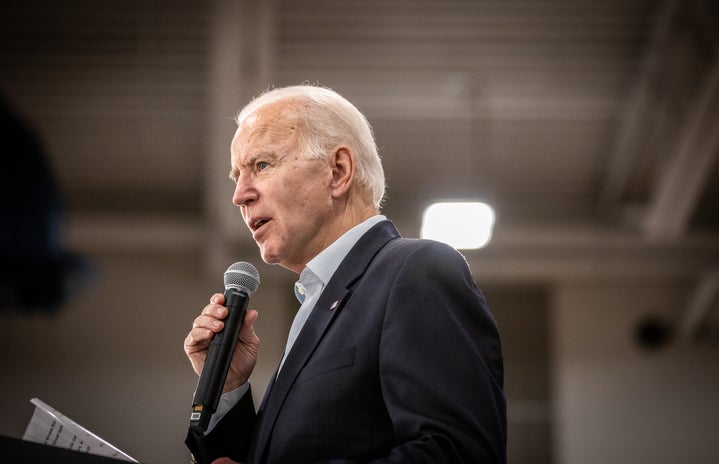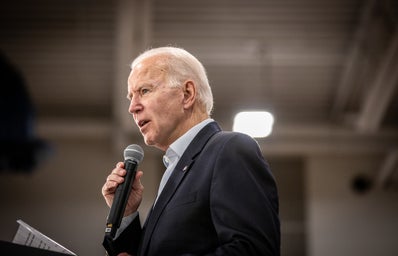The Fourth of July will be a very happy day for the Americans, after all, a good part of the population will be immunized against Covid-19. This, at least, is the plan of Joe Biden, president of the United States, which wants the permission for any adult American citizen to be vaccinated as of May 1. With no plans to export doses after the vaccination of risk groups ends, Biden puts his America first.
On March 12, 100 million doses of the coronavirus vaccine were applied. In addition, after a month of work, the president reversed the harmful Donald Trump’s agreements to global warming and built a diverse team in various management positions. What else did Biden do? How is Brazil in the middle of this? Her Campus Cásper Líbero made an analysis of the first actions of the Biden government.
- Who’s by the side of the president?
-
Besides the Vice President Kamala Harris, Biden also has Antony Blinken as Secretary of State, who met him in the Senate, was an adviser to Bill Clinton and worked as Executive Secretary to John Kerry. Ronald Klain is also familiar to Biden, since working as his chief of staff, while the current president was vice, now he returns to assume the position. For the essential job at the Health Secretariat, the chosen one was the attorney general of California and defender of the rights of Latin Americans, Xavier Becerra, who is in favor of Obamacare, the health program of former President Barack Obama and questioned by the government Trump.
Janet Yellen, who was once the chairman of the Federal Reserve, is head of the Treasury Department, while former Michigan governor and advocate for renewable energy, Jennifer Granholm, has been announced as secretary of energy. Former Public School teacher and Commissioner of Education in Connecticut, Miguel Cardona, was chosen for the position of Secretary of Education. John Kerry was Secretary of State during Obama’s second term and is now the presidency’s special envoy to the climate; Pete Buttigieg, the new transport secretary, was one of Joe Biden’s opponents in the Democratic Party’s 2020 previews.
Lloyd Austin, appointed as secretary of defense, was chief of different US operations in different Middle Eastern countries for three years when Barack Obama was president. William Burns, new director of the CIA, was responsible for the secret negotiations between the US and Iran that culminated in the nuclear deal and worked as an ambassador in Russia and Jordan. Alejandro Mayorkas is the new head of the Department of Homeland Security, famous for being the first Latin and immigrant in office, he was already director of the immigration and citizenship service in the first Obama administration and executive secretary of Homeland Security in the second management.
Linda Thomas-Greenfield is the current ambassador to the UN, she also served as Assistant Secretary of State for African Affairs in the State Department from 2013 to 2017. Avril Haines has been appointed as director of the National Intelligence Service and has held vice positions. Another woman who identifies herself as an African American is Marcia Fudge, new secretary for Housing and Urban Development.
Gina Raimondo, a moderate Democrat who was governor of the state of Rhode Island, is now secretary of commerce; while Marty Walsh, a former Boston mayor and union member, is now secretary of labor. Isabel Guzman is the new head of the Small Business Administration and has worked at the federal agency during the Obama administration. Indian deputy Deb Haaland was appointed as secretary of the interior and Tom Vilsack, secretary of agriculture, held the post in the Obama administrations.
- Vaccination: America first (and only)
-
“We must end the politics and misinformation that’s divided families, communities and the country. It’s cost too many lives already. It’s not Democrats and Republicans who are dying from the virus. It’s our fellow Americans. It’s our neighbours, our friends, our mothers, our fathers, our sons, our daughters, husbands, wives. We have to fight this together as one people, as the United States of America. That’s the only way we’re going to beat this virus, I promise you”, said the president in his speech of one month in the office.
In addition to the rejection of misinformation and the incentive to follow the recommendations of the World Health Organization, such as wearing a mask, maintaining a social distance and using hand sanitizer, Biden focuses his efforts on vaccination and control of the financial crisis. In March, $1.9 trillion was released for the crisis caused by the Covid-19 pandemic.
With the success of the Johnson & Johnson single-dose vaccine, from which he acquired 100 million applications, as well as purchasing 400 million doses of the pharmaceuticals Pfizer / BioNTech and Moderna, Biden makes the United States one of the countries with the largest quantity of doses acquired.
According to a statement released in March, the intention is to vaccinate all adult Americans, and not just those belonging to the risk group, as in other administrations. The decision emphasizes global social inequality, it is estimated that about 90% of people in 70 low-income countries will have little chance of being vaccinated in 2021, according to a study by the American university Duke released by BBC News.
- China: a worn-out relationship
-
The United States’ relationship with China went into crisis during the Trump administration and was put in check by the citizens themselves. Cases of violence have been reported against people with family roots in countries on the Asian continent. The justification is a false theory that blames citizens of the East for the pandemic.
After weeks without going into the issue, in March Biden took the first step towards a new relationship with Asian countries. Issues can be resolved during a tour of the Secretary of State and the head of the Pentagon on the continent, with a focus on China – and the relationship does not seem to be going on good terms.
They met with Japan’s Defense and Foreign Affairs ministers, and American politicians will also pass through South Korea. The two allied countries are expected to announce opposition to Beijing’s new law, which allows the country’s Coast Guard to fire on foreign ships. Another topic will be how to react to China’s repeated forays into Japan’s territorial waters around the Senkaku Islands, in the South China Sea, and the installation of anti-missile systems. With the end of the agenda with these two countries, China and India will be visited by politicians.
- Racial equality, immigrants and the end of the wall
-
In the middle of an election campaign that took place during the recent boom of the Black Lives Matter movement in the United States, it would not be possible to govern on good terms without demonstrating changes in policies that promote equality, especially racial. The government’s first initiative was to include “Identifying Methods to Assess Equity” and “Allocating Federal Resources to Advance Fairness and Opportunity” as an executive order on January 20, named “Racial Equity Address.”
Another initiative was a White House memorandum issued on Tuesday January 26, titled “Condemning and Combating Racism, Xenophobia, and Intolerance Against Asian Americans and Pacific Islanders in the United States”. Alongside the statement, the president also made a public pledge to crack down on xenophobia against Asian-Americans: “The Federal Government must recognize that it has played a role in furthering these xenophobic sentiments through the actions of political leaders, including references to the Covid -19 pandemic by the geographic location of its origin.”
On the issue of immigrants, Biden has been working to reverse the ban on Muslims in the country and extreme immigration enforcement, including the building of the Mexico-US border.
- LGBTQ + Rights
-
First, Biden nominated Pennsylvania’s top health official, Rachel Levine, to be his assistant secretary of health – a move that would make Levine the first openly transgender federal official to be confirmed by the US Senate.
On January 20, the The White House published a statement titled “Executive Order on Preventing and Combating Discrimination on the Basis of Gender Identity or Sexual Orientation”, in which Biden announced an end to the ban on transsexuals from military services.
“Transgender service members will no longer be subject to the possibility of discharge or separation on the basis of gender identity, President Biden believes that gender identity should not be a bar to military service, and that America’s strength is found in its diversity”, says the document.
- Environment and Climate Change
-
Following his line of reversing Trump’s attitudes, Biden signed an executive order beginning the process of rejoining the 2015 Paris climate agreement. In addition, the president revoked the Keystone XL Pipeline, which environmentalists and Native American groups have fought for more than a decade.
- Gun Control
-
On February 14, Biden referred to the three-year anniversary of the Parkland school shooting in Congress, in order to enact “common sense” gun laws. The objective is to ban assault weapons and make background checks a requirement for all gun sales.
He is the first president to raise the issue of gun registration in more than 50 years, since President Lyndon Baines Johnson, this has not happened. He’s also the first ever to propose banning new sales of “assault” or tactical, semi automatic weapons. But, the plan is a battle in the Congress, as the Republican party does not approve the change.
- Brazil: the relationship with Bolsonaro
-
Although President Jair Bolsonaro congratulated Biden, the politician was one of the last to take this step, after years of open support for Donald Trump. So far, no essential negotiations for Brazil have been declared, since among several divergences of opinions with our country, Biden still gives preference to the North American Free Trade Agreement between the USA, Mexico and Canada, NAFTA.
In an interview with DW Brazil, Nestor Forster, Brazil’s representative in Washington, stated: “The change that is noticeable is one of style, of emphasis, but the relationship continues on a deeper bed that unites Brazil and the United States. What has changed? The Biden government came up with a very firm agenda in the area of the environment and climate change.”
- What ‘s next?
-
Sabrina Bomtempo is a political scientist from the University of Brasília, associated with the Center for Contemporary Culture Studies (CEDEC) and a political consultant and researcher at BaseLab. In an exclusive interview with Her Campus Cásper Líbero, Bomtempo spoke about Biden’s next challenges, dividing them into two groups, internal and international.
“Biden takes over in the midst of the biggest health crisis in recent times, so the effects of the Covid-19 pandemic is a natural challenge and is already expected for this government, which, in addition to the health effects, also needs to work with the serious impact in the economy of the Americans, especially the black citizens. Therefore, it will be up to the president to apply social security measures taking into account the reality of profound social inequality that exists in the country. Concomitantly, the government faces a race against the advance of the pandemic, which is migrating to a fourth wave within the country, the challenge now is to be able to immunize the largest number of people per day and beat the speed that the virus spreads ”, says scientist policy about national health issues.
Bomtempo continues calling attention to the minimal difference in votes in his election, the fake news that questions the veracity of the vote and the attack on the Capitol. “Even with the conciliation skill and political experience that the new president carries, the polarized political scenario presents itself as a challenge to the unifying agenda that he proposes. Thus, even with a majority in the Chamber and the Senate, this does not mean that the decisions have already been decided, an example of this is that Biden tried to pass in Congress an economic recovery package, which was approved in the Chamber of Deputies, but had to wait for a considerable time in the Senate, which presents itself as a challenge to the president. Even if approved, we cannot use this measure as a parameter to predict the success of the president’s next proposals, since the pandemic context presents an exceptionality and capacity to unify decisions, but nothing guarantees that the posture will remain on other government agendas of the Biden government”.
On foreign policy, the political scientist points out that the problem lies in the reconstruction of the international image after Trump’s administration. “The USA has lost its prominence in several foreign relations, making room for China, which is now advancing in trade relations with other countries and raising tension in the commercial war with the USA. In addition, there is a bad climate in the resumption of relations, because the internal polarization causes fear in the allied countries, which still do not have confidence in the non-resumption of an authoritarian government in four years ”.
“I believe that recovering the confidence of external allies is the biggest challenge at the international level that the Biden government will face now”, concludes Bomtempo.
———————————————————————-
The article above was edited by Camila Nascimento.
Liked this type of content? Check Her Campus Casper Libero home page for more!


